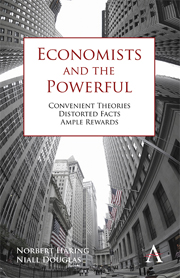Chapter 4 - Market Power
Published online by Cambridge University Press: 05 February 2013
Summary
Businessmen, who regard themselves as being subject to competitive conditions, would consider absurd the assertion that the limit to their production is to be found in the internal conditions of production in their firm, which do not permit of the production of a greater quantity without an increase in cost. The chief obstacle against lies in the difficulty of selling the larger quantity of goods without reducing the price, or without having to face increased marketing expenses.
—Piero Sraffa, 1926The simple version of neoclassical textbook economics has produced a set of recommendations for economic policy that most people accept as the essence of economic reason. One of these conclusions is that when companies are taxed, they produce less and employ fewer people. When they have to pay higher wages to satisfy unions, or obey minimum wage laws, it has the same consequence (again according to textbook economics). Such conclusions are based on some rather peculiar assumptions about competition. In the perfect competition case, which textbooks treat as the norm, there is no profit. Companies all ask the same price, which just covers their costs (in a broad sense). Workers are also subject to perfect competition. For a given quality of labor (where quality is defined exclusively in terms of productivity), they all get the same market-determined wage that makes them indifferent to which job they work, their own or the many others they could take at the same wage.
- Type
- Chapter
- Information
- Economists and the PowerfulConvenient Theories, Distorted Facts, Ample Rewards, pp. 141 - 162Publisher: Anthem PressPrint publication year: 2012



